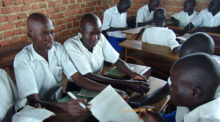Stephen Toope
Throughout most of my lifetime, when Africa has hit the headlines, it’s largely been bad news. Drought, famine and heart-rending images of starving, diseased children. Tribal conflict, civil war, apartheid, genocide. The tragic impact of HIV/AIDS.
There have been moments of optimism. Newly independent countries enthusiastically charting their own course. The end of apartheid in South Africa. Slow but steady progress on health and education. Most recently, economic booms and rapidly rising GDP in resource-rich countries.
The African continent is blessed with abundant natural resources of oil, gas and minerals – with the largest reserves of cobalt, diamonds, platinum and uranium in the world. Young people aged 15-24 currently make up just over 20% of the population; that is expected to double to 42% by 2055. It has a growing middle class and entrepreneurs who are making their mark. Might Africa be the next engine of global growth?
Countering this optimism are troubling signs. Botswana’s exceptional growth, for example, has been eroding as a slow-down in South Africa has reduced export demand. Diamond reserves look set to run out within 30 years. In Libya, civil war is threatening oil production and export. African economies are experiencing the blessing and curse of natural resources Canadians know only too well: insufficient diversification and vulnerability to global commodity price swings. Famine and dangerous instability still threaten countries around the continent.
Africa’s 1.1 billion people reside in 54 countries with highly diverse climates and speak an estimated 1,500-2,000 languages. Any broad-brush statements about the continent will inevitably be riddled with caveats. I feel confident in making two.
The first is that investment in education at all levels is critical. The growing youth population will be either a great asset or a ticking time-bomb. Unemployed youth can get angry and activist – for better or worse. Uninformed youth may worsen instability. Highly educated young people are better equipped to take control of their lives and step up to leadership in nation-building.
Great strides have been made in achieving universal primary education – an important first step. But governments are not paying sufficient attention to essential higher education and development agencies have been turning their attention elsewhere. That is a mistake.
Second, to realize the promise of the resources with which they’re endowed, these countries need good governance. They need leaders committed to stamping out corruption throughout the system – not distracted by fighting charges against them and their cronies. They need leaders who heed the voice of the people, not tyrannical dictators who ride roughshod over human rights and refuse to relinquish power even as their countries grow poorer and angrier.
Good governance also depends on a strong civil service armed with the data, expertise and resources to provide counsel and effectively manage essential services. We know, for example, that famines rarely result from an overall lack of food, but rather from fiscal and administrative decisions that hamper distribution systems or put the cost out of reach. We know that simple things like registering children at birth and giving them a legal identity can have huge impact on their destiny.
At the Munk School, we’ve had good success with work on bolstering the civil service in Nigeria and improving delivery of social services to the hard-to-reach poorest of the poor (including birth registration in South Africa). As a former colony, we in Canada are well placed to work with Africans on the development of culturally appropriate good governance practices, without seeking to impose foreign systems. Canada’s most recent budget was light on details of what and how we intend to invest in international assistance. I hope that the Canadian government will begin to reinvest in Africa, focusing on support for education, including higher education, and on improvements to governance systems.
April 3, 2017
